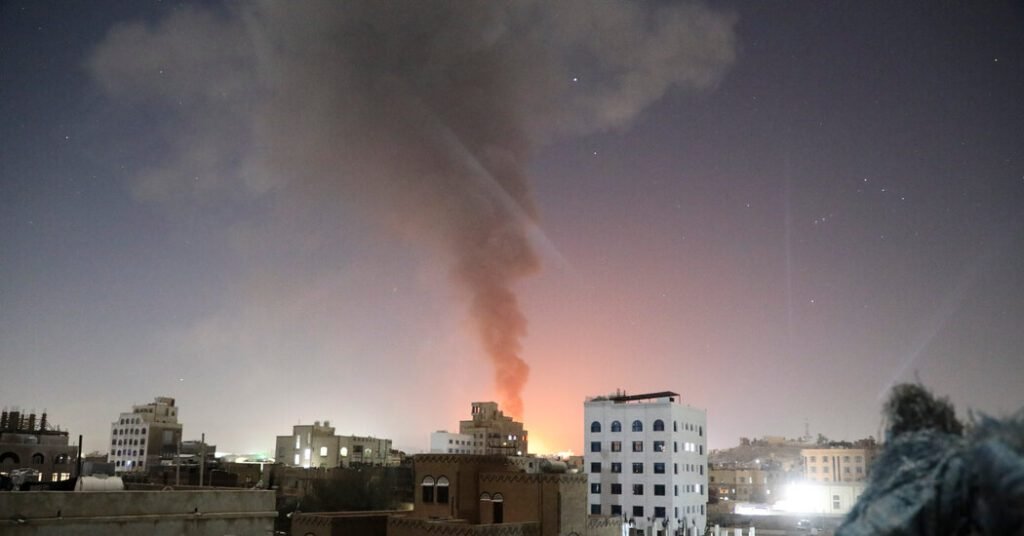The United States and Britain carried out another round of large-scale military strikes on Saturday against several sites in Yemen controlled by Houthi militants, US officials said.
The strikes were intended to degrade the ability of Iran-backed militants to attack ships in sea lanes critical to global trade, a campaign they have been waging for nearly four months.
US and British warplanes hit missile systems and launchers and other targets, the officials said. Australia, Bahrain, Canada, Denmark, the Netherlands and New Zealand provided support for the operation, according to a joint statement from the countries involved emailed to reporters by the Ministry of Defence.
The strikes, which the statement called “necessary and proportionate,” hit 18 targets in eight locations in Yemen related to Houthi underground weapons storage facilities, missile storage facilities, one-way unmanned aerial attack systems, air defense systems, radar and a helicopter.
“These precision strikes are intended to disrupt and degrade the capabilities the Houthis use to threaten global trade, naval vessels and the lives of innocent seafarers in one of the world’s most critical waterways,” the statement said.
The strikes were the biggest salvo since allies hit Houthi targets on February 3 and came after a week in which the Houthis aggressively launched drones and cruise and ballistic missiles into the Red Sea and Gulf of Aden.
In a statement provided to The Associated Press, the Houthis denounced “US-British aggression” and said they would not be deterred. “The Yemeni Armed Forces confirm that they will counter the US-UK escalation with more qualitative military operations against all enemy targets in the Red and Arabian Seas in defense of our country, our people and our nation,” the statement said. .
On Monday, Houthi fighters fired two anti-ship ballistic missiles at a cargo ship, the US Central Command said in a statement. The ship, named Sea Champion, continued to its destination in the Yemeni port of Aden, the statement added. Central Command reported several other skirmish attacks that day between US forces in the area and the Houthis.
On Thursday, it was more of the same. US warplanes and a ship belonging to a member of the US-led coalition shot down six Houthi attack drones in the Red Sea, the Central Command said in another statement. The drones “likely targeted US and coalition warships and posed an imminent threat,” he added.
Later that day, the statement said, the Houthis fired two anti-ship ballistic missiles from southern Yemen into the Gulf of Aden, hitting the Islander, a British-owned Palau-flagged cargo ship. The boat was damaged and one person was slightly injured.
And earlier Saturday, the naval destroyer USS Mason shot down what Central Command said was an anti-ship ballistic missile fired from Yemen into the Gulf of Aden.
The Houthis say their attacks are a protest against Israel’s military campaign in Gaza, which began in response to Hamas attacks on Israel on October 7.
US-led air and naval strikes against Houthi targets began last month.
“The more than 45 Houthi attacks on commercial and naval vessels since mid-November pose a threat to the global economy as well as regional security and stability and require an international response,” the US-led coalition said in a statement on Saturday. . .
In a separate statement Saturday night, Defense Secretary Lloyd J. Austin III said the Houthi attacks were “damaging Middle East economies, causing environmental damage and disrupting the delivery of humanitarian aid to Yemen and other countries.”
The United States and several allies have repeatedly warned the Houthis of dire consequences if the fighting does not stop. But US-led strikes have so far failed to deter the Houthis. Hundreds of ships were forced to take a long detour around southern Africa, driving up costs.
Of all the Iranian-backed militias that have escalated hostilities in solidarity with the Palestinians in Gaza, the Houthis have been perhaps the most difficult to contain. While the Houthis have continued their attacks, Shiite militias in Iraq and Syria appear to be enjoying a period of quiet since the United States carried out a series of strikes against Iranian forces and the militias they support in Syria and Iraq on February 2. .
Middle East experts say that after nearly a decade of avoiding airstrikes in a war with Saudi Arabia, the Houthis have become adept at hiding their weapons, placing some of them in urban areas and firing missiles from behind part of the vehicles before driving away.

